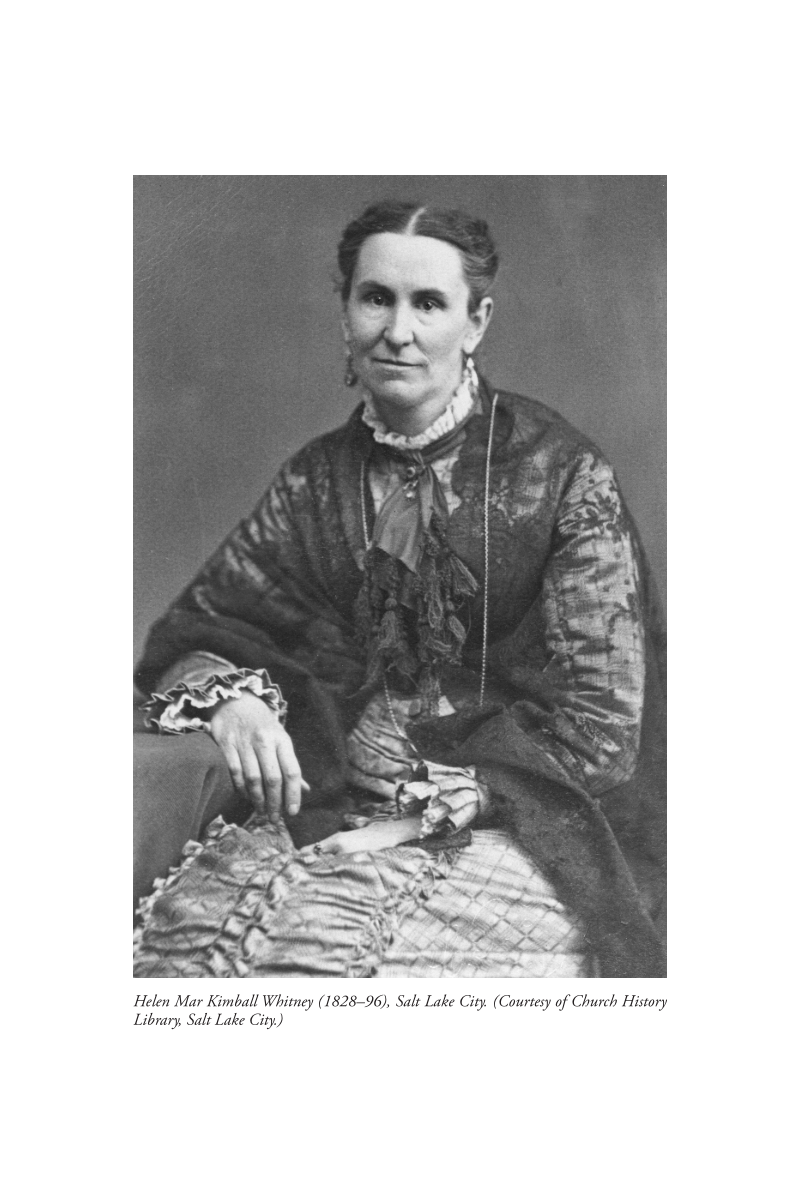J. Spencer Fluhman reviews evidence for sexuality in Joseph's marriage to Helen Mar Kimball.
- Type
- Academic / Technical Report
- Source
- J. Spencer Fluhman LDS
- Hearsay
- Secondary
- Reference
J. Spencer Fluhman, “‘A Subject That Can Bear Investigation’: Anguish, Faith, and Joseph Smith’s Youngest Plural Wife,” in No Weapon Shall Prosper: New Light on Sensitive Issues, ed. Robert L. Millet (Provo, UT: Religious Studies Center, Brigham Young University; Salt Lake City: Deseret Book, 2011), 107–109
- Scribe/Publisher
- BYU Religious Studies Center, Deseret Book
- Audience
- Reading Public
- Transcription
Readers concerned about whether or not the marriage was consummated are left without conclusive evidence for or against. In all her reminiscing, Helen neither confirmed nor denied a physical relationship. This was not the case with all the plural wives, however. After the Civil War, when Reorganized Church critics charged that Joseph Smith’s relationships with other women were purely spiritual unions, Latter-day Saints marshaled convincing evidence that at least some of the plural marriages had been consummated. While the question of sexuality thus remains open, there is no documentary evidence that such was the case with Helen. In fact, her reminiscences convey little social interaction with Joseph Smith after the marriage, let alone an intimate physical relationship. In a retrospective poem written to convey her feelings about her youthful sealing, Helen described nothing of a close bond—she even wrote that the “step” she took was “for eternity alone,” convincing some historians that the marriage was unconsummated. What does emerge powerfully from the poem, though, is a sense of her dashed dreams of romantic love and missed social opportunities: “Thy sicken’d heart will brood and imagine future woes, / And like a fetter’d bird with wild and longing heart, / Thou’lt dayly pine for freedom and murmur at thy lot.” The poem ended where her reminiscences did, with a statement of trust in her father. For his part, Heber Kimball wrote to Helen just weeks after her sealing: “My child, remember the care that your dear father and mother have for your welfare in this life, that all may be done well, and that in view of eternal worlds, for that will depend on what we do here, and how we do it; for all things are sacred.”
Helen’s emphasis on “eternity alone” and her father’s underscoring of the “view of eternal worlds” points to the otherworldly significance each attached to her marriage. Viewed from any angle, Nauvoo plural marriages contradict modern expectations. Helen’s marriage was not rooted in romantic feelings, mutual attraction, or an emotional bond. To the contrary, she sensed that her marriage provided spiritual benefits for her and her family. Looking back across the years, she wrote that those benefits had constituted a large share of her motivation to enter into the marriage: “Joseph . . . came next morning & with my parents I heard him teach & explain the principle of Celestial marrage—after which he said to me, ‘If you will take this step, it will ensure your eternal salvation and exaltation & that of your father’s household & all of your kindred. This promise was so great that I willingly gave myself to purchase so glorious a reward.” Neither a starry-eyed nor love-struck proposal, Joseph Smith’s to Helen resembles others recorded by the Prophet’s wives; each reported that he couched his proposal in the language of revelation, obedience to God’s law, and the promise of eternal rewards. Joseph Smith’s proposals, in other words, mirrored the 1843 revelation on celestial marriage (see D&C 132), which highlighted law (see vv. 3–7, 11–12, 15–19, 21, 24–28, 31–34, 37, 48, 54, 58–66), obedience (see vv. 3–5, 53–55, 64–66), and afterlife blessings (see vv. 19–24, 55, 63).
According to Helen, her father was similarly motivated. The argument that Joseph Smith initiated plural marriages for his own lustful purposes fails to account for the fact that, in Helen’s case at least, it was her own father who proposed the marriage. Her father taught her “the principle of Celestial marrage,” Helen wrote in 1881, “& having a great desire to be connected with the Prophet, Joseph, he offered me to him; this I afterwards learned from the Prophet’s own mouth.” Kimball’s desire to be “connected” to Joseph Smith, curious as it may be to modern Saints, somewhat reorients the marriage away from questions of Joseph Smith’s motivations. What did Elder Kimball hope to achieve by “offering” Helen? Why would a marriage to Joseph Smith have been preferred over one to a man closer to Helen’s own age? Why the urgency about marrying her off so young?
- Citations in Mormonr Qnas
The B. H. Roberts Foundation is not owned by, operated by, or affiliated with the Church of Jesus Christ of Latter-day Saints.

